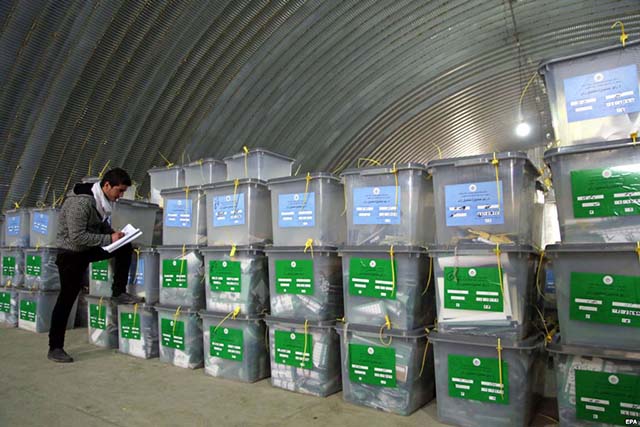Despite the recent breakthrough in the electoral reforms stalemate, the process still seems to be stalled with the government failing to get the relevant authorities start working on the formation of the two election commissions. According to the reports, the government is yet to authorize the Selection Committee and other relevant authorities to begin consultations on selection of new commissioners for the Independent Election Commission (IEC) and the Electoral Complaints Commission (ECC). Despite the signing of the long-awaited presidential decree on the electoral reforms by President Ashraf Ghani, there are suggestions of divisions among political leaders over the reforms process. A deputy of the electoral reforms commission, Sediqullah Tawhidi, warned on Thursday of serious consequences if the authorities continue to fail implementing the reforms.
The continued failure of the government to proceed the reforms based on the recommendations of the electoral reforms commission suggest much deeper problems existing over the crucial reforms process. The legal obstacle that blocked the way for starting implementation of the reforms process is now resolved with the recent presidential decree on the reform plan that was signed by the President about a week ago. The government should have begun implementation of reforms process and tasked the selection committee to start its work on formation of the two election commissions. Seemingly, the government leaders are still far away from having the required consensus over the reforms and the formation of the bodies involved with both the reforms process and future elections in the country.
It seems there are power struggle going on among certain circles within the government over the reforms process and the future electoral bodies that are to be selected by the selection committee. Tawhidi’s remarks suggest that certain circles within the government and loyal to one of the stakeholders of the national unity government are attempting to influence the process by having appointed their favored individuals in the electoral bodies. The recent delays in the electoral reforms process must have been resulting not only from the legal stalemate over the presidential decrees but also on the divisions hovering over the reforms process.
The leaders of the national unity government have long and rightly insisted on their determination to make the reforms and deliver the promises for better governance and transparency of future elections. There is now a broach political consensus among the leaders of the national unity government for reforming the electoral system and processes. However, there are divisions simmering on the lower levels tiers and members of the two main political blocs of the presidential election-era along with other political circles are competing for more influence over the reforms process. For these political circles, more influence over the ongoing reforms process is meaning having more influence over the future elections in the country.
The divisions will most probably stay over along the process. The stakeholders of the country’s politics including the two main political blocks within the government will attempt to manipulate the process so that they will have influence on the national institutions responsible for holding future elections. However, the leaders of the national unity government need to ensure the political rivalries do not block or tamper with the legitimacy of the reforms process. They need to ensure the task will be done in a way to be acceptable to the entire political spectrum of the country. The politicians need to ensure that they will play the game fair and will not undermine the country’s long-term interests. The output of the electoral reforms will be the legacy of the national unity government. Therefore, the leaders need to realize the immensity of the task and be cognizant of the legacy they will leave behind.
The signing of the presidential decrees is a major breakthrough in the process, and should open a way forward for implementation of the reforms recommended by the electoral reforms commission. The leaders need to end the delays in the process and ensure smooth process of the implementation of the recommended reforms. The government needs to restore public trust into the reforms process by making tangible progresses in the process as the last week’s signing of the presidential decree over the electoral reforms. It will help the government to overcome challenges existing for the political development of the country particularly for leading and delivering a successful electoral reform and paving the way for holding the upcoming parliamentary elections.
The national unity government cannot afford a time-consuming and undermined process of electoral reforms. It will harm its credibility and that of the stakeholders of the government. The failure to deliver the reforms process will leave the country’s politics vulnerable to adverse unexpected developments. It will undermine the future political experiments including the upcoming parliamentary elections in the country. There is much to be done in the preparations for the parliamentary and provincial council elections. The government must avoid the current parliament going into the second and third years of working beyond its legal term. The government needs to hold the parliamentary election in a sooner possible time and hold it fairly and transparently. For all these, the government needs to exhibit a show of political will and assure the public that the electoral reforms process is heading to the right direction.
Home » Opinion » The Electoral Reforms Still in Disarray
The Electoral Reforms Still in Disarray
| Abdul Ahad Bahrami

